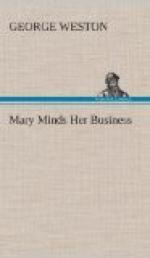“A serenade!” she whispered excitedly. “Im-a-gine!”
She tip-toed to the window and, kneeling on the floor, watched the singers through the curtain—knowing well it wasn’t for her, but drinking deep of the moment.
Slowly, sweetly, the chorus grew fainter—fainter—
“Nita—Juanita
Ask thy soul if we should part—”
“What do you think of that!” said Helen, leaning over and giving her cousin a squeeze and a kiss. “He had the two Garde boys and Will Thompson with him. I thought he was leaving earlier than usual tonight; didn’t you? But a serenade! I wonder if the others heard it, too!”
Miss Patty and Miss Cordelia had both heard it, and Helen had hardly gone when they came pattering in—each as proud as Punch of Mary for having caused such miracles to perform—and gleeful, too, that they had lived in the land long enough to hear a real, live serenade. And after they had kissed her and gone, Ma’m Maynard came in with a pretty little speech in French. So that altogether Mary held quite a reception in bed. As one result, her feeling toward Wally melted into something like tenderness, and if it hadn’t been for the tragic event next morning, the things which I have to tell you might never have taken place.
“I wonder if your father heard it,” said Miss Patty at the breakfast table next morning.
“I wonder!” laughed Mary. “I think I’ll run in and see.”
According to his custom Josiah breakfasted early and had gone to his den to look over his mail. Mary passed gaily through the library, but it wasn’t long before she was back at the dining room door, looking as though she had seen a ghost.
“Come—come and look,” she choked. “Something—something terrible—”
Josiah sat, half collapsed, in his chair. Before him, on the desk, lay his mail. Some he had read. Some he would never, never read.
“He must have had a stroke,” said Miss Cordelia, her arms around Mary; and looking at her brother she whispered, “I think something upset him.”
When they had sent for the doctor and had taken Mary away, they returned to look over the letters which Josiah had opened as his last mortal act.
“I don’t see anything in these that could have bothered him,” said Miss Cordelia, fearfully looking.
“What’s this?” asked Miss Patty, picking up an empty envelope from the floor.
It was post-marked “Rio de Janeiro” and the date showed that it had taken three weeks to make the journey.
“I have some recollection of that writing,” said Miss Cordelia.
“So have I,” said Miss Patty in a low voice, “but where’s the letter?”
Again it was she who made the discovery.
“That must be it,” she said. “His ash tray is cleaned out every morning.”
It was a large, brass tray and in it was the char of a paper that had been burned. This ash still lay in its folds and across its surface, black on black, could be seen a few lines which resembled the close of a letter.




